► Porsche’s electrification plans explained
► Macan and Cayman to go pure-electric
► New flagship electric SUV planned, too
Porsche has confirmed that it’s working on a new, pure-electric luxury SUV. It’ll sit above the Cayenne in the company’s line-up, becoming the third EV in the firm’s portfolio after the Taycan and the upcoming electric replacement for the Macan.
In uncharacteristically candid fashion, chairman of the Porsche board Oliver Blume told CAR Magazine that his company will soon ‘add a new luxury all-electric SUV model’ to its line-up and that it will ‘roll off the production line in Leipzig.’
The decision is sure to displease Porsche’s die-hard fanbase, but the brand says the move will be good for business. Blume added: ‘We are targeting the higher margin segments in particular, and aim to tap into new sales opportunities in this way.’
Porsche hasn’t yet confirmed when its new electric SUV will be launched or what it’ll be powered by, but there are two avenues the company could pursue. Option one is for the car to share its underpinnings with Bentley’s upcoming electric SUV, which is set for launch in 2025.
That car will likely be based on the same PPE chassis as the new Audi A6 e-tron, which should give it a maximum range of around 400 miles and plenty of performance. The flagship RS6 e-tron is expected to have as much as 800bhp, which is more than enough to suit Porsche and Bentley’s performance electric SUVs.
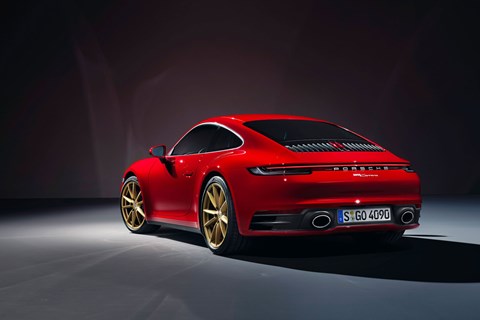
Option two is for Porsche to wait until 2026 and roll its flagship luxury EV out on the Volkswagen Group’s new Scalable Systems Platform. This architecture will unify the strengths of the giant’s MEB and PPE chassis, acting as the base for more than 40 million Volkswagen Group vehicles during its time in production.
Either way, Porsche’s new electric SUV will be built with the help of other Volkswagen Group brands. Blume said Porsche’s ability to take advantage of its parent company’s vast resources is the main reason why it has survived through major crises like the coronavirus pandemic, semiconductor shortage and war in Ukraine.
We’ll update you with more info on the car when it’s available. For now, though, scroll down for the full debrief on Porsche’s electrification plans.
What’s Porsche doing with electric cars right now?
Porsche, like all other car makers, has strict CO2 targets to meet. So, it has been slowly expanding its range of hybrids and pure-electric cars. By 2030, the company aims to be completely carbon neutral and expects 80 percent of its sales to come from pure-electric vehicles.
Oliver Blume, Porsche’s CEO, told CAR Magazine: ‘We have a very clear strategy for the next 10 to 15 years in the transition period. We go for three engine options: we’ll continue with our petrol engines like our 911 and continue to improve them even more, then we continue with our very successful hybrid cars and think about engineering a performance hybrid.’
Porsche’s two largest cars – the Panamera and the Cayenne – are currently available with have both an efficiency-focused e-Hybrid and a performance-orientated Turbo S e-Hybrid model. But it sounds like Porsche will push the envelope further, improving on the 690bhp offered by the flagship Panamera hybrid.
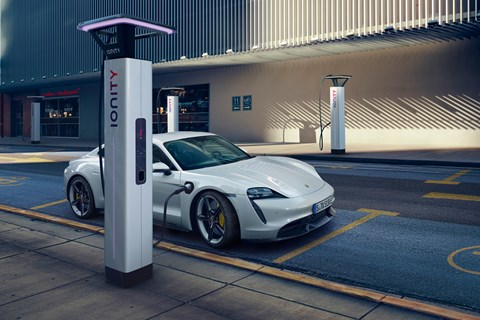
But plug-in hybrids won’t be enough to satisfy legislators. The European Parliament has voted to ban the sale of internal combustion cars in 2035 – and the UK has set a tighter deadline of 2030. So, if Porsche wants to keep selling cars in these regions, it needs to throw some money at EVs. Thankfully, it’s already doing so.
Porsche launched its first electric car, the Taycan (pictured above), back in 2019 – and we’ve already mentioned the two electric SUVs scheduled for launch soon. Porsche also invested heavily in the Croatian EV hypercar maker Rimac, buying a 45 percent share in the company mid-way through 2021. That decision should help move along any plans Porsche has for an electric sports car. More on that in a bit, though.
Porsche Taycan: the brand’s first full EV
The Taycan BEV was the vanguard of Porsche’s electric car plans. Blume told CAR Magazine: ‘It was a big challenge to start this project and define very clearly what was our goal to achieve. For us it was very clear: when we design and engineer a car, it has to be 100 percent Porsche with all the Porsche items from driving dynamics and quality.’
The Taycan can be specified as a saloon, an estate (known as the Sport Turismo) and an off-road inspired estate (called the Cross Turismo). There are four powertrains available, offering between 250–280 miles of range and a 0–62mph time of 2.8 seconds on the flagship Turbo S variant. Prices range from £75,000 to a whopping £142,000 for the saloon.
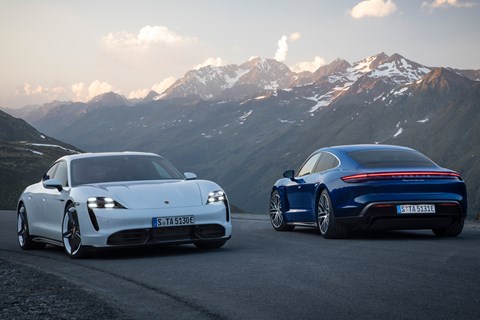
Blume talked us through the thinking behind the Taycan’s broad model range, focusing on the importance of appealing to a broad range of buyers. He said: ‘This combination to use the platform of the base Taycan for a car which you can use for all your own sports interests and for going off-road: there’s a very real combination.’
He continued, saying: ‘For Cross Turismo, to build a car with more space and the ability to go off-road. I’ve already tested the car in off-road surroundings and was as excited as driving the Taycan we present on the racetrack.’
The great electric car switchover: who’s going EV when
The Macan goes full electric
Remember Porsche’s stake in Rimac? The Taycan didn’t benefit from it because it had already been signed off by the time the deal was closed. However, the next Macan will take full advantage of the Croatian firm’s expertise.
Lutz Meschke, deputy chairman of the Porsche AG board, mentioned how the acquisition would benefit his firm’s development programme. ‘We quickly realised that Porsche and Rimac can learn a lot from each other,’ he said. ‘We believe in what Mate Rimac and his company have to offer.’
Mate Rimac, founder and MD of Rimac, added ‘We are only at the start of our partnership – yet we have already met our high expectations. We have many collaborative ideas that we aim to bring to life in the future. The fundamental focus is creating a win-win situation for both partners and offering our end customers added value by developing exciting, electrified models.’
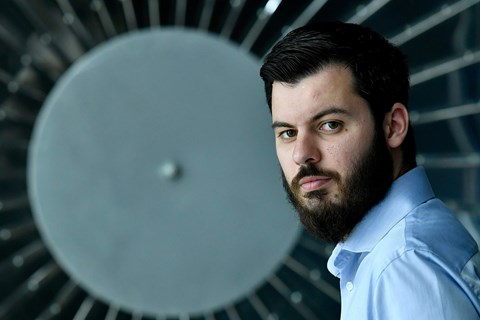
So, what does that mean for the Macan? Porsche confirmed the next-generation car will definitely be pure-electric and it will use the Premium Platform Electric underpinnings. It’s an 800v battery-electric platform that’s being primarily developed by Porsche, although the wider Volkswagen Group will have access to it. Audi, for example, will create a range of electric cars on the underpinnings in the coming years. Porsche also confirmed that the next electric Macan will be built at its facility in Leipzig, too. We expect to see the all-electric Macan later in 2023.
What’s next for the 718 sports car twins?
CAR insiders suggest the current 718 Boxster and Cayman will soldier on until 2023, before Porsche decides what to do with the next generation. Luckily for petrolheads, the brand has expanded the range of six-cylinder variants with its GTS 4.0 option.
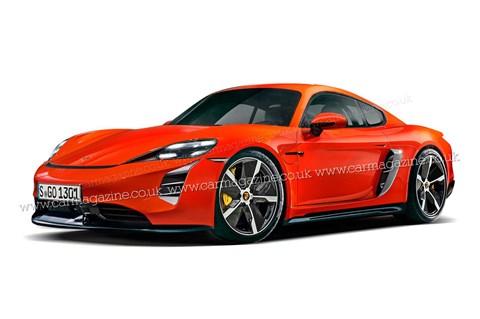
In mid-2019, Blume told CAR Magazine that engineers were already working on prototype versions of an electric 718. More recently, Meschke has confirmed it’ll be here by 2025, saying: ‘We are pushing ahead with our electric offensive: by the middle of the decade, we want to offer our 718 mid-engine sports car exclusively in all-electric form.’
Our artist’s impression above gives you an idea of how the new car will look when it arrives. We also expect the final car will take some inspiration from the 2022 Porsche Mission R prototype.
Will there be an electric Porsche 911?
The short answer is ‘no;’ the long answer is ‘not for quite a while.’ Meschke told us that making an electric 911 ‘will be a bit difficult, but for the 718 I think it could be a very good step for the future.’
Instead, the 992-generation 911 will remain a combustion-engined car until the facelift arrives. Porsche says that this generation of platform is compatible with a hybrid powertrain, but it’s waiting until the ‘992.2’ version to introduce it (this 911 family update is anticipated in 2023).
The fate of the next-generation 911 remains uncertain. A fully-electric 911 would upset a lot of Porsche loyal fans – but there could still be a lot of life left in the petrol engine yet, especially if Porsche’s synthetic fuel project gets off the ground. The firm has already designed an eco-friendly replacement for fossil fuel-based petrol, made by blending carbon captured from the atmosphere with hydrogen.
It’s a completely carbon-neutral fuel – and, until it’s burned, it works to reduce the amount of carbon dioxide in the air. The only challenge facing Porsche now is to make the biofuel affordable enough for widespread use.
What about a Porsche electric hypercar?
Porsche has been lacking an ultimate halo car since the hybrid-powered 918 Spyder – and it’s something the brand is keen to get back into. So long as it has real-world applications; Porsche isn’t about to churn out a biblically-powerful hypercar for the sake of it, but experiments are being conducted behind closed doors.
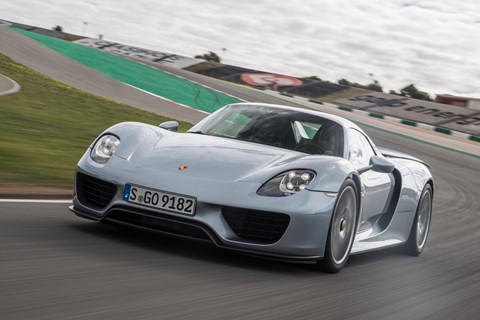
Blume told CAR Magazine: ‘Hypercars belong to Porsche. It’s technically always been our strategy, but we don’t engineer hypercars to engineer hypercars – our kind is to improve innovation.’ It’s telling that Porsche’s chairman and deputy chair, Lutz Meschke, both sit on the supervisory board of Bugatti-Rimac…
‘We haven’t decided on the car yet, and we are still working on the concept and thinking about how to improve the chemistry of the batteries,’ Blue said. ‘But when we come to the point where we are very clear what configuration should be in a car like this, then we will decide. But it will be before the half of the next decade.’
Further electric car reading
The best electric cars and EVs on sale today
How much does it cost to charge an electric car?
The best hybrids, plug-ins and PHEVs
Wireless electric car charging